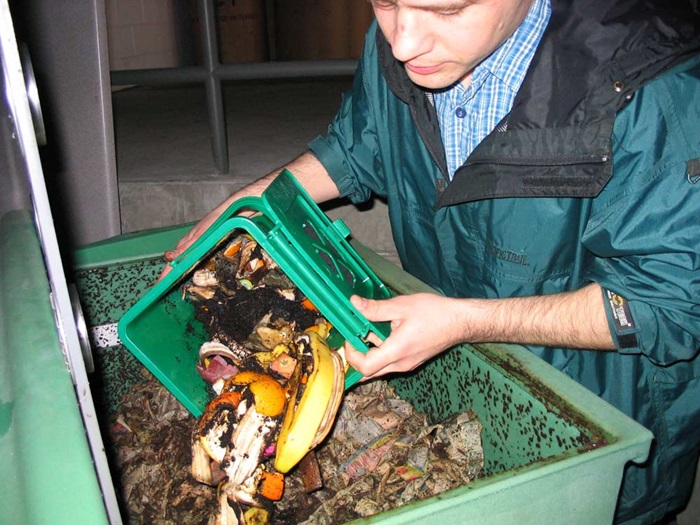Backyard composting & garden amendments
Composting transforms yard debris and food scraps into a valuable soil amendment. It’s one of the best ways to reduce waste, cut garbage costs, and support healthy landscapes. Learn how to create and apply backyard compost, use an onsite commercial container, and more.
What are organics and compost?
Each of us creates waste as part of our daily lives. A big part of this waste comes from natural products. Organic materials like food scraps, wood, grass clippings, and even biosolids (a byproduct of wastewater treatment) are often seen as useless. But these materials are full of nutrients that our environment needs. Composting organic materials transforms them into a valuable amendment that keeps soil healthy.
Benefits of using compost in your garden
- Reduces waste sent to the landfill
- Purchasing locally-produced compost supports the local economy
- Addresses climate change by reducing greenhouse gases emissions from landfilling
- Helps suppress weeds and weed seeds.
- Serves as a sponge that retains water for plants.
- Filters storm water, keeping pollutants from entering waterways.
- Reduces pesticide use and serves as a natural fertilizer for plant health
- Improves soil health
- Provides natural beauty and character that looks great in Pacific Northwest landscapes.
Creating your own backyard compost
Home gardeners and those who don’t have access to compost collection can learn to do backyard composting. We recommend these free guides:
- Washington State University: Backyard composting
- Seattle Public Utilities: Composting yard and food waste at home
- The Garden Hotline: Composting advice
Or you can use a worm bin to vermicompost. Vermicompost is the process of red wiggler (eisenia fetida) worms converting food scraps into a soil amendment.
You can purchase a worm bin locally or make your own.

Commercial on-site composting
Most on-site composting systems are "in-vessel," meaning the compost is fully contained and vermin resistant. Containers range in processing capacity and price point. Some handle a couple of pounds per day while others can handle thousands of pounds per day. Schools often find that in-vessel composting systems are excellent teaching tools.
Read more about compost systems in our on-site composting pilot program report
Where to buy organic materials
The Puget Sound region is host to a thriving industry of organic material processers, yielding many sources of locally generated materials such as compost and recycled wood. Bagged supplies of compost and wood products such as mulch are available in many home improvement stores and nurseries. For larger projects, there are many local sources for bulk quantity supplies:
**Bulk quantity supplies table below**
Bulk quantity supplies
| Business | Locations | Compost | Recycled wood products |
|---|---|---|---|
| All Wood Recycling | Redmond | ✔ | |
| Bailey Compost | Snohomish | ✔ | |
| Cedar Grove | Bellevue, Everett, Maple Valley, Seattle, Redmond, Woodinville | ✔ | ✔ |
| Dirt Exchange | Seattle | ✔ | ✔ |
| Fruhling Sand and Topsoil | Bothell | ✔ | ✔ |
| Lenz Enterprises | Stanwood | ✔ | ✔ |
| Lloyd Enterprises | Milton | ✔ | ✔ |
| Pacific Topsoils | Issaquah, Kenmore, Maltby, Marysville/N. Everett, Maple Valley, Mill Creek, North Seattle | ✔ | ✔ |
| Rainier Wood Recyclers | Covington | ✔ | |
| Sunset Materials | Renton | ✔ | ✔ |
Note: King County maintains this resource list as a courtesy to the public and does not endorse or guarantee the quality of the service offered or provided.
Compost resources
- Tilth Alliance – local composting information and classes
- Washington Organics Resource Council (WORC) – education, research, and advocacy regarding organic material reclaim, reuse, and recycling
- U.S. Composting Council – promotes organic materials recycling through composting
 Translate
Translate